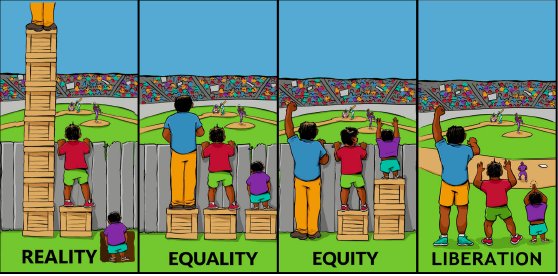The following are resources that Magnify Community has collected for donors seeking to learn more about Diversity, Equity, and Inclusion (DEI), and to apply a DEI lens to enhance the positive impact of their grantmaking.
Many of these are resources selected for us by the thoughtful philanthropy leaders who were part of our May 6 virtual salon on DEI in Grantmaking. Read their bios here.
This list is by no means comprehensive, but a place to begin a journey.
Recommended by Karen Grove, Trustee, Grove Foundation
- Waking Up White and Finding Myself in the Story of Race, by Debby Irving
“This is a beautifully written memoir of a white woman’s awakening to the world of white privilege that shaped her and follows her journey as she gains a broader perspective that illuminates the privileges she and her family enjoyed simply because they were white. She shares her guilt, her embarrassment, and her humiliations as she strives – first to “help” low income African American school kids in her role as an arts organization fund-raiser – and then to really understand, connect with, and support anti-racists and people of color. She writes with vulnerability and compassion for her 'clueless self' and shares the history of structural racism in America as she learns it, as well as her emotional journey."
- The Warmth of Other Suns, by Isabel Wilkerson
“This long, non-fiction book about the great migration of blacks from the South to the North and West focuses on the story of three individuals. The author interviewed each subject for years, and she tells each story with deep empathy and love. It is a beautiful book. I almost put it down in the first 100 pages or so...; I’m glad I kept reading. By the end, I dreaded finishing, because I did not want to lose George, Robert, and Ida (the three central characters). Each character’s story is supported by historical anecdotes, data and demographics. The setting and circumstances of life in the South was sobering, horrifying, and sad. So much of literature and film protects us from the worst of it, but this book does not."
- Silent Racism: How Well Meaning White People Perpetuate the Racial Divide, by Barbara Trepagnier
“This book is dense and academic, but it’s one of the first books I read on race, so I include it in my list. The main idea is that well-meaning people could have powerful leverage if they would just recognize their own racism and work to correct it. The thesis reminds me of 'girl-bullying' (or indirect relational aggression) which can be more hurtful than 'boy-bullying' (or direct aggression) because it is hidden under a veil of 'niceness' and therefore the victim blames herself rather than the bully, making it more hurtful and harder to address. The author makes a similar argument for why silent racism is more damaging than overt racism.”
- How to Be Black, by Baratunde Thurston
“It turns out you can learn a lot while laughing! This is a 'satirical self-help book' by the digital director of the Onion. Very funny, and also enlightening. Introduced me to many other smart black writers and artists, who constitute his 'all black expert panel,' which he enlisted so he does not have to 'speak for all black people' (which is one of the things he – satirically - covers in “How to Be Black".
- Scene On Radio’s Seeing White
“An excellent history of how race was constructed in this country, with a focus on whiteness. Really interesting, truthful, painful and liberating, view of US History. 'Seeing White' is liberating in that it releases us (white people) of the work it takes to ignore our whiteness and allows us to see social and political and power dynamics more clearly. Learning how whiteness and racism factored into the 'bones' of our nation is painful, but allows us to move forward with clarity and a greater promise for progress.”
- Decolonizing Wealth, by Edgar Villanueva
“Really good, especially for philanthropists and people with wealth!”
- Just Mercy, by Bryan Stevenson
“Beautiful, painful book.”
- 13th, film directed by Ava DuVernay
- When They See Us, directed by Ava DuVernay
- New York Times,1619 Project podcast series and interactive magazine
Recommended by Tamara Alvarado, Executive Director, Leo M. Shortino Foundation
- Anti-Bias Continuum Chart
- Decolonizing Wealth, by Edgar Villanueva
Recommended by Judi Powell, Vice President of Program, Pacific Foundation Services
- Aligning Practice with Values: Introducing Meyer’s New Grants Process, by Jane Robinson Ward
"New blog post (January 2020) by the Meyer Foundation in Washington, DC, about the steps it took to redesign its grants process to be more equitable and inclusive.” - Eliminating Implicit Bias in Grantmaking Practice, by Nancy Chan and Pamela Fischer
"It’s a little old, but includes some concrete steps that funders can take." - Diversity, Inclusion and Effective Philanthropy, Rockefeller Philanthropy Advisors
“Part of the Philanthropy Roadmap series”
Recommended by Armando Castellano, Trustee, Castellano Family Foundation
- In Philanthropy, Race Is Still a Factor in Who Gets What, Study Shows, by Paul Sullivan
"Timely and germane."
- Blueprint For Change: A Call to Action for Silicon Valley Philanthropy to Engage and Support Latinx Organizations, Communities, and Leaders for the Common Good, by Castellano Family Foundation
Recommended by Magnify Community
- 3 Ways Foundation Heads Can Lead on Racial Equity, by Ben Hecht
-
A Long Way to Go: What Kind of Change is Needed Within Foundations to Advance Racial Equity? by Michael Hamill Remaley
- White Fragility, by Robin DiAngelo
-
5 Sources of Bias in your Grant Application Review Process, by Submittable
-
Bay Area Equity Atlas, produced by San Francisco Foundation, PolicyLink, and the USC Program for Environmental and Regional Equity

